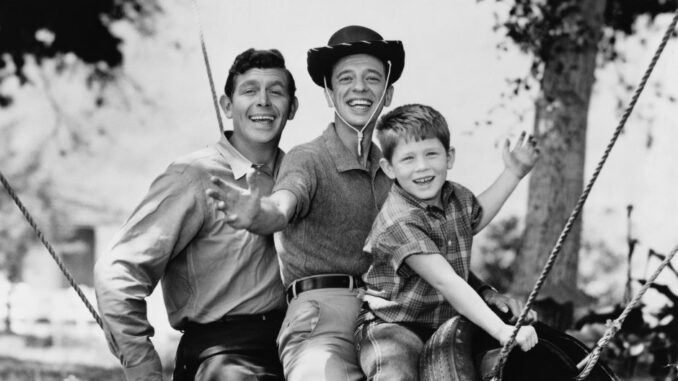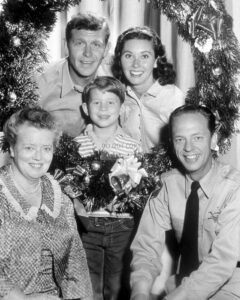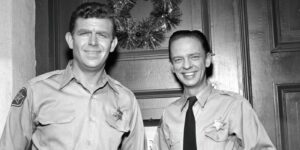
The Impact of ‘The Andy Griffith Show’ on Ron Howard’s Career
A Star at a Young Age
From a young age, Ron Howard was immersed in the world of acting. He was only six when he first appeared on ‘The Andy Griffith Show,’ quickly becoming a fan favorite. His character, Opie, was not just a sidekick; he was the heart of the show. But what did Howard really understand about his role back then?
Learning from Experience
As he grew older, Howard’s perspective on acting and storytelling evolved. What seemed like mere entertainment to a child became a profound source of life lessons as he matured. In college, he began to analyze his experiences on the show and recognized how they shaped his understanding of narrative and character development.
Realizations at College: A New Perspective

Understanding Humor and Its Roots
One of Howard’s significant realizations was the depth of humor in ‘The Andy Griffith Show.’ The series employed subtle, character-driven humor that was often overlooked.
Did you know? Many jokes were layered, revealing themselves only upon deeper reflection. In college, Howard learned the nuances of comedy and realized how the show’s humor reflected real-life situations, making it timeless and relatable.
The Importance of Community
While filming, Howard may not have fully grasped the importance of community depicted in the show. College brought him into contact with diverse groups, allowing him to appreciate the portrayal of Mayberry’s tight-knit community.
Why does this matter? The values of friendship, loyalty, and kindness are central themes in the show, resonating with audiences even today.
Themes That Transcend Time
Simplicity in Storytelling
Howard discovered that the simplicity of ‘The Andy Griffith Show’ was its strength. The plotlines were often straightforward but packed with meaning. College taught him the value of clarity in storytelling, which is essential for any great narrative.
Moral Lessons Hidden in Humor
The series was famous for imparting life lessons through humor. Howard realized that many episodes tackled serious themes, such as justice, morality, and family values, wrapped in light-hearted storytelling.
Can you think of a show today that does this? Few contemporary sitcoms manage to blend entertainment with such moral depth.
Cultural Context: A Broader Understanding

Reflecting Societal Values
Ron Howard’s education opened his eyes to how ‘The Andy Griffith Show’ reflected societal values of the 1960s. While filming, he experienced the show’s impact firsthand, but college provided a historical and cultural context that enriched his understanding.
What were the values of that era? The show promoted ideals such as honesty, hard work, and community involvement, offering a glimpse into American life during a transformative time.
Exploring the Civil Rights Movement
During his college years, Howard learned about the Civil Rights Movement, which highlighted social injustices and the need for change. Reflecting on ‘The Andy Griffith Show,’ he recognized its somewhat sanitized portrayal of life, which didn’t always address the pressing social issues of its time.
Reflections on Character Development
More Than Just a Boy
In college, Howard examined his character, Opie, more critically. He realized Opie was a reflection of innocence and curiosity, navigating the complexities of growing up.
Have you ever considered the character’s depth? Opie represented the audience’s perspective, asking questions and learning alongside viewers.
The Role of Parental Influence
Howard also reflected on the character of Andy Taylor, played by Andy Griffith. As a father figure, Andy represented ideal parental guidance, embodying wisdom and love.
What makes a great dad? Through Andy, viewers learned about patience, understanding, and moral integrity, qualities that resonate beyond the screen.
Behind the Scenes: The Making of Magic
Learning About Production
In college, Howard delved into the production side of television, gaining insights into how shows are crafted. He understood the teamwork that brought ‘The Andy Griffith Show’ to life, appreciating the collaborative effort required in storytelling.
The Art of Directing
Howard’s education also ignited his passion for directing. He recognized how directing choices shaped the series’ tone and pacing. His later success as a director would be influenced by the techniques he learned from his time on the show.
The Legacy of ‘The Andy Griffith Show’
A Lasting Influence
Years after its final episode, ‘The Andy Griffith Show’ continues to influence modern television. Howard’s realizations about the series underscore its lasting impact on the entertainment industry.
What makes a show timeless? It’s the ability to resonate across generations, teaching lessons that remain relevant.
Inspiring Future Generations
As a filmmaker and storyteller, Ron Howard aims to inspire future generations, just as ‘The Andy Griffith Show’ inspired him. He understands the power of storytelling and how it shapes culture and society.
Conclusion
Ron Howard’s journey from child star to accomplished filmmaker is a testament to the growth that education can foster. His college years provided a lens through which he could reevaluate ‘The Andy Griffith Show,’ uncovering deeper meanings and themes that were previously unnoticed. The series remains a beloved part of American television history, and Howard’s reflections highlight its significance in shaping not only his career but also cultural values that continue to resonate today.
